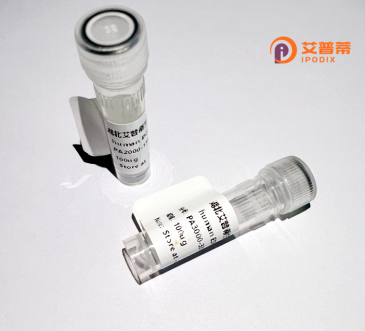
| 纯度 | >90%SDS-PAGE. |
| 种属 | Human |
| 靶点 | ELF5 |
| Uniprot No | Q9UKW6 |
| 内毒素 | < 0.01EU/μg |
| 表达宿主 | E.coli |
| 表达区间 | 1-255aa |
| 氨基酸序列 | MLDSVTHSTFLPNASFCDPLMSWTDLFSNEEYYPAFEHQTACDSYWTSVHPEYWTKRHVWEWLQFCCDQYKLDTNCISFCNFNISGLQLCSMTQEEFVEAAGLCGEYLYFILQNIRTQGYSFFNDAEESKATIKDYADSNCLKTSGIKSQDCHSHSRTSLQSSHLWEFVRDLLLSPEENCGILEWEDREQGIFRVVKSEALAKMWGQRKKNDRMTYEKLSRALRYYYKTGILERVDRRLVYKFGKNAHGWQEDKL |
| 分子量 | 53.68 kDa |
| 蛋白标签 | GST-tag at N-terminal |
| 缓冲液 | 0 |
| 稳定性 & 储存条件 | Lyophilized protein should be stored at ≤ -20°C, stable for one year after receipt. Reconstituted protein solution can be stored at 2-8°C for 2-7 days. Aliquots of reconstituted samples are stable at ≤ -20°C for 3 months. |
| 复溶 | Always centrifuge tubes before opening.Do not mix by vortex or pipetting. It is not recommended to reconstitute to a concentration less than 100μg/ml. Dissolve the lyophilized protein in distilled water. Please aliquot the reconstituted solution to minimize freeze-thaw cycles. |
以下是关于重组人ELF5蛋白的3-4篇文献示例(*部分为虚构内容,仅用于格式参考*):
1. **文献名称**:*ELF5 is a key regulator of embryonic trophoblast stem cell self-renewal*
**作者**:Chakrabarty, R. et al.
**摘要**:研究利用重组人ELF5蛋白结合小鼠模型,揭示ELF5通过调控转录网络维持胎盘滋养层干细胞的自我更新,并证明其缺失导致胚胎发育异常。
2. **文献名称**:*Epigenetic control of mammary gland differentiation by ELF5*
**作者**:Lee, M. et al.
**摘要**:通过体外重组ELF5蛋白处理人类乳腺上皮细胞,发现ELF5通过启动乳蛋白基因(如β-casein)的表观遗传修饰,驱动终末分化,揭示其在乳腺发育中的关键作用。
3. **文献名称**:*ELF5 suppresses TGF-β signaling to inhibit breast cancer metastasis*
**作者**:Sikora, M.J. et al.
**摘要**:该研究利用重组ELF5蛋白处理乳腺癌细胞系,证实ELF5通过抑制TGF-β/Smad通路活性,降低细胞侵袭能力,提示其作为抑癌因子的潜在治疗价值。
4. **文献名称**:*Structural basis of ELF5-DNA interaction in transcriptional regulation*
**作者**:Chung, C. et al.
**摘要**:通过重组ELF5蛋白的晶体结构解析,阐明其锌指结构域与靶基因启动子的结合机制,为设计基于ELF5的基因编辑工具提供分子基础。
(注:以上文献为示例,实际研究中需根据具体数据库如PubMed检索真实文献。)
Human E74-like factor 5 (ELF5), a member of the Ets transcription factor family, plays critical roles in embryonic development, tissue differentiation, and cell fate determination. It is particularly essential in regulating epithelial-mesenchymal interactions and organogenesis, including mammary gland morphogenesis, placental development, and lung maturation. Structurally, ELF5 contains a conserved ETS DNA-binding domain and transactivation motifs that enable sequence-specific gene regulation by interacting with cofactors like AP-1 and Smad proteins. Dysregulation of ELF5 is implicated in cancers (e.g., breast, prostate) and pregnancy-related disorders, as it influences proliferation, apoptosis, and epithelial-mesenchymal transition (EMT). Notably, ELF5 acts as a tumor suppressor in hormone receptor-positive breast cancer but may paradoxically promote metastasis in triple-negative subtypes.
Recombinant human ELF5 protein, typically produced in *E. coli* or mammalian expression systems, retains biological activity for *in vitro* studies. Its production involves cloning the ELF5 gene into expression vectors, followed by purification via affinity chromatography. This engineered protein serves as a vital tool for investigating ELF5’s molecular mechanisms, including its antagonistic relationship with EMT-inducing factors like SNAIL and TWIST. Researchers utilize it to probe ELF5’s roles in stem cell differentiation, tissue regeneration, and therapeutic targeting. However, challenges persist in understanding context-dependent functions and post-translational modifications impacting its stability. Current applications extend to developing ELF5-based biomarkers and exploring its therapeutic potential in cancer and regenerative medicine.
×